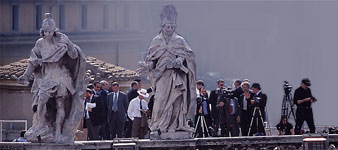

Rome, April 27-29, 2006
Fifth Professional Seminar for Church Communications Offices
  Rome, April 27-29, 2006 Fifth Professional Seminar for Church Communications Offices |
The Ecumenical and Inter-religious responsibility of Church Communication Offices Prof. Joan-Andreu Rocha Scarpetta
Abstract:
After offering some considerations on the concept of "religious other", and the specific trends underlying Church, Christian and Religious Communication, the Paper presents a comprehensive synthesis of the different levels of Ecumenical and Interfaith dialogue according to the Catholic Church's Magisterium, from where three main levels of involvement of Church Communication Officers in Interfaith and Ecumenical dialogue can be deduced: 1) Information as language identity; After proposing some specific examples that illustrate the practice of this three levels of "dialogue" from the perspective of Church Communication Offices, the Paper concludes with a description of a growing new paradigm in Church Communication that gives a prominent place to the Inter-cultural dimension of Modern Society and to the importance of self identity as the crucial starting point for an effective Ecumenical and Interfaith Communication.
|
|||||||||
Pontifical
University oh the Holy Cross © 2005 School of Church
Communications |